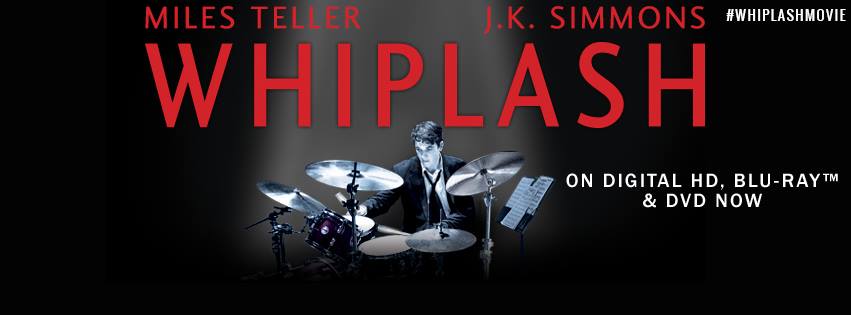
Film Writer Cassandra Fong argues Whiplash is a compelling portrait of musical obsession
Images by
Whiplash
Trigger Warnings: mentions of blood
When Whiplash was first released as a full-length film in 2014, director Damien Chazelle had not yet broken into mainstream attention. This was the film that changed it for him, and it is no surprise: the intensely volatile dynamic of ambitious jazz drummer Andrew Neiman (Miles Teller) and his ruthless instructor, the conductor Terence Fletcher who relentlessly pushes all of Andrew’s limits in his quest for perfection (J.K. Simmons) made for a compelling sophomore film.
What is the difference between devotion and compulsion? Neiman earns a place at Fletcher’s studio band at the prestigious Shaffer conservatory as first alternate then core drummer, two positions he quickly learns are very precarious, and is tested on how much blood he can spill and how quickly he builds up a frenzied pace at the drums. Fletcher’s chiding refrain of “not my tempo” becomes inexorably threatening with each repetition, humiliating and browbeating his students without thinking twice.
Scenes where they interact are saturated with low, warm lighting. It’s a soft placidity that rapidly reveals the stark intensity of Fletcher’s foul-mouthed tirades as he explodes into a frightening temper beneath his sneering exterior. Andrew learns well from his teacher. He slowly slips between his pride and self-abasement as his hands bleed and break. His selfish impulses and abrasive outbursts all but reverberate through the screen as he sacrifices his familial bonds, his possible friends and his girlfriend, approaching implosion or detonation with each beat of the stick against the drum. It is no coincidence that his short-lived romantic subplot is limited to two scenes, as if she was never in the same timeline as him with his drive and ambition and single-minded focus.
Sublimely powerful in its portrayal of the brutal physicality of music
The clever choice of focusing on the drum as an instrument and as a tool of psychological torment, of making us see the skin vibrate as it’s struck and splintered when Andrew punches a hole through it, ramps up the tension inherent in a downward spiral. As blood, tears and sweat begin staining the drum’s membrane, the audience is reminded more of a crime scene than a rehearsal. The irony of restriction in a genre that is built on improvisation is richly displayed in scenes where students practice, frantically turning pages and struggling to meet the uncompromising ideal Fletcher has for musical perfection.
A sadomasochistic battle of wills between instructor and student? Definitely. A retelling of Frankenstein, where the intended creation of beautiful perfection is beyond his control through arrogance and hubris? An argument could definitely be made for that. They turn every rehearsal into a fight scene, culminating in a violent altercation after a badly injured Andrew can only offer a subpar performance, but the most fascinating parts of the movie are undoubtedly during the little moments: Andrew unblinkingly submerging his bleeding hand in icy water, Fletcher’s disdainful glance towards a folder of sheet music in the beginning, their long pointed stare across Carnegie Hall in the final act. Their mind games are rooted in a shared ideology of suffering as the mother to success, and the ending is almost a happy one if you share their mindset: to everyone else, it is a simply terrifying reminder of the dark side to devotion towards one’s craft.
They turn every rehearsal into a fight scene
It is undeniable that Andrew becomes an incendiary performer under Fletcher’s tutelage. Every scene swings, ebbs and flows like jazz as a genre does, yet it feels as though each cut answers its predecessor. A very shrewd shot at the beginning shows Andrew’s sheet music being placed onto his music stand slightly faster than his actual movement in his profile shot: he hasn’t met the perfect tempo Fletcher’s instilled in his head yet. He viciously pushes himself under Fletcher’s stern gaze, drumming so quickly his wrists are a blur and he visibly strains with the effort, but it is made very clear that his music is the only thing that brings him to life. It is hard to say that it was an unhappy ending for him.
The standout part of the film is undoubtedly its beautiful soundtrack, including various jazz standards. The score was cleverly produced one note per time to layer and manipulate the sound, mimicking the mind games played throughout the film. Its frenzied, unpredictable rhythm that becomes progressively feverish is used to great effect as tensions ramp up towards the end of the film.
Whiplash is an exhilarating, intense journey with a very singular, dramatic momentum. Sublimely powerful in its portrayal of the brutal physicality of music and the emotional distress that comes with the gritty determination of unwavering zeal, it is a magnificent piece of cinema and fully deserves a revival in mainstream attention.
Read more from Film:
The Bear is back: where next for Paddington?

Comments